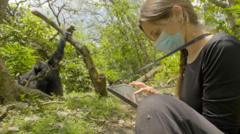On a lush afternoon in April, Ryan Huish stands amidst the vibrant green woods of Duffield, Virginia, guiding university students on a journey through a thriving garden filled with medicinal herbs. This isn't your typical farm; instead, it is a glimpse into a cultural heritage where native plants like ramps, trout lilies, and Appalachian wasabi have been cherished for generations. As a professor at the University of Virginia’s College at Wise, Huish is keen to intertwine education with community engagement, encouraging students to harvest the plants that have long been part of Appalachia's tradition of food, medicine, and economic sustenance.
For over 300 years, the Appalachian Mountains have seen the trade of forest botanicals, a practice rich with history yet fraught with challenges due to poor regulation. With insufficient oversight, lower prices and overharvesting have threatened this lucrative market. Problems have compounded as traditional knowledge about these valuable botanicals fades with each passing generation. Katie Commender, who heads the agroforestry program at Appalachian Harvest Herb Hub, emphasizes this challenge, stating, “When we talk to ginseng dealers and root buyers, a lot of the concern we hear is that tradition is dying out and not necessarily being passed on to the next generation.”
In response to these concerns, farmers have come together to form collaborative networks aimed at creating a more sustainable and profitable herbal supplement market. This initiative not only supports their livelihoods but also encourages the preservation of Appalachian cultural heritage. As community members plot their path forward, they are not just nurturing plants but also a renewed sense of community, bridging the gap between generations and integrating environmental stewardship into their practices.
As they strive to find solutions to the issues affecting their traditional trade, the people of Appalachia remind us that the preservation of culture and sustainable practices can coexist, ensuring that the bountiful resources of the forest continue to thrive for generations to come.





















